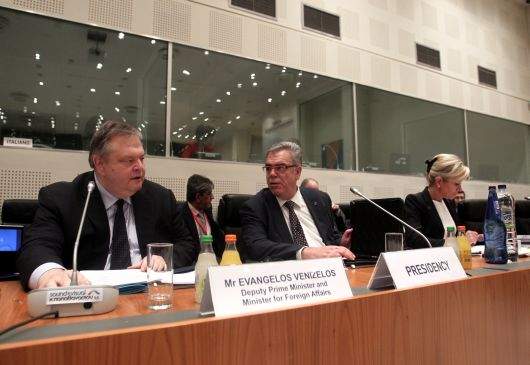 Ladies and Gentlemen, Dear colleagues,
Ladies and Gentlemen, Dear colleagues,
First of all, welcome to Athens. It is indeed a pleasure to see you all here today, especially in view of long political debates currently under way in our capitals following the results of the elections for the European Parliament. But it is exactly this time frame that is conducive to the pertinence of the thematics of our discussions here, today.
The European Elections confirmed that the EU, our common home, is currently at a critical juncture. And the Council of Ministers at a crossroads.
The political problems arising from the elections for the new European Parliament are:
The rise of the extreme right, or even of openly pro-Nazi parties in some member states. The linear thinking that says that this is a product of the economic crisis is mistaken. Because there are member states that, despite experiencing a major crisis, do not have such phenomena. And there are also member states that have not been hit very hard by the crisis, but nevertheless have seen the development of this phenomenon. So we have to look in depth at the shifts in the stratification of European societies and in the boundaries of European citizens’ political conduct.
A faceless, bureaucratic European Union becomes an easy target in the name of democracy, of national sovereignty, and of social cohesion. We thus have the contradictory phenomenon of the fundamental values of the European Union going from being tools for the promotion of European integration, to becoming hypocritical arguments in the hands of the extreme right.
Second, the rise of euroscepticism of all kinds. Beside the traditional political nationalistic euroscepticism, we also have economic euroscepticism that derives from the impact of European policies.
Third, the express concern of many European societies regarding the substance of economic policy. The fundamental demand for growth and the creation of new jobs must be served through all of the specific, individual policies of the Union and by the economic governance institutions themselves, of both the EU-28 and the eurozone. The citizens of Europe want the combination of national and European policy to produce, in practical terms, the best possible results for them.
Consequently, the process of choosing a new President of the Commission and of filling all the critical posts in the Union’s institutional structure – including the President of the European Council, the High Representative, and so on – naturally concerns, first and foremost, the recognition of the enhanced role of the European Parliament and the relations between the Parliament and the European Council.
But it also concerns, deep down, the interpretation of the results of the European elections and our perception of the real social and political situation in Europe.
This concerns the European balance of power, as reflected in the composition of the European Parliament, but also inter-governmental power relations, which, in their turn, have to do with longstanding national strategies of the member states, as well as with the state of affairs in the domestic political balance of power in the member states.
Thus, what is really needed now is the formulation of a comprehensive narrative for Europe; a narrative that requires agreements amongst the European political parties and amongst the member states. So it is reasonable that this should also be linked to domestic political developments in all the member states.
Consequently, the process of choosing a new President of the European Commission – and all the other choices – is a critical process that concerns the interpretation of the Treaty and the relationship between the organs.
But what is most critical is that this be preceded by a visionary and comprehensive interpretation of the situation in Europe, and that the political decisions taken provide a substantive response to the concerns and priorities of European citizens.
The items on the Agenda today are not intended to provoke discussions for possible Treaty amendments.
The Treaties in force, which were concluded after a long period of reflection, are adequate for the effective functioning of the inter-institutional relations and provide opportunities not yet thoroughly exploited.
The Hellenic Presidency chose to discuss the issues of the GAC’s strengthening and the perspective of inter-institutional arrangements not only for their institutional dimension, but mainly for the emergence of policy options.
EU needs the General Affairs Council as a forum for substantive political debate and the inter-institutional agreements as guardians of the EU institutional balance and effective function.
We have already sent you two consultation documents, outlining our thoughts on the Agenda’s two items, respectively.
Today we are looking forward to getting your feedback, so we can develop
a plan that will work and will be able to deliver results during the
next Presidencies.
May 30, 2014


